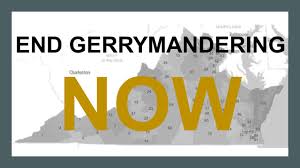 By DJ RippertThey’ll be back (in office forever).
By DJ RippertThey’ll be back (in office forever).
The USC Schwarzennegger Institute released a report finding that Virginia had the highest degree of partisan gerrymandering among all U.S. states. The report analyzed the “statewide popular vote in 2017 or 2018 state legislative elections and the partisan composition of the state legislative chambers in 2019.” While other studies draw somewhat different results, Virginia is often near the top of the list of “most gerrymandered states.” In mid-2019 the U.S. Supreme Court upheld a lawsuit by Virginia voters challenging Virginia’s voting districts on racial grounds.
As the USC report states, “Self-interested legislators who seek reelection have long attempted to draw their own districts to protect their personal reelection chances and to improve the electoral odds of their political party.” Repeating for emphasis, Virginia is not only one of many states with extreme gerrymandering, it is rated by this study as the most extreme case of partisan gerrymandering. This is no accident. It is the result of deliberate actions by members of our General Assembly hailing from both parties.
Partisan gerrymandering is a form of voter suppression and disenfranchisement. It should not be allowed and Virginia should certainly never be the worst offender. Beyond that, the Virginia Constitution states, “Every electoral district shall be composed of contiguous and compact territory and shall be so constituted as to give, as nearly as is practicable, representation in proportion to the population of the district.” A state does not become the worst example of partisan gerrymandering in the United States by using contiguous and compact districts. Once again our General Assembly’s actions show that they believe laws are for the little people and not for themselves.
Non-competitive state legislative elections. Gerrymandering helps create politicians for life. As Jeff Thomas points out in his excellent book, The Virginia Way, Democracy and Power after 2016, “For the first time in the long history of the state, in November 2015, every politician who ran for reelection won, an incredible 122 out of 122.” This is no coincidence. It is partially the result of active, intentional partisan gerrymandering by our General Assembly. However, Virginia’s non-competitive elections are caused by more than partisan gerrymandering. There are other overt actions implemented by the Virginia Constitution or in Virginia law that further reduce the competitiveness of our elections. To wit, here are some of the main culprits:
- Unlimited campaign contributions – Vast oceans of money from special interests, rent seekers and crony capitalists pour into the coffers of Virginia politicians as campaign contributions. As one of only five states to allow unlimited campaign contributions Virginia effectively requires a massive fundraising program to credibly run for office. These days, it even costs a lot to lose. Read more here.
- No term limits for state legislators – Virginia is the only state in the Union where a sitting governor cannot run for a second term. Yet this fascination with term limits at the top finds no corollary among the legislative class. There are no term limits for delegates or senators in Virginia. Other states have taken steps to avoid “politicians for life.” In 15 states legislators are subject to term limits.
- Off-year and off-off year elections – Virginia is one of only five states to hold elections on odd-numbered years. The others are Mississippi, Kentucky, New Jersey and Louisiana. This is expensive. Kentucky officials estimate that running odd year elections adds $15.4 million to the cost of elections over a four year cycle. Odd-year elections also mean lower voter turnout. Just 29% of Virginians cast their ballots in 2015 compared with 72% in the presidential election the following year. More details here. Intentionally scheduling elections to ensure low turnout is just another form of disenfranchisement. While some will blame potential voters for not voting, the money-wasting approach to odd year elections is no different than limiting the number of polling places in a populous area to discourage potential voters through inconvenience.
Change?
There have been recent efforts in Virginia to amend the state constitution in order to block (or at least reduce) partisan gerrymandering. Unsurprisingly, the recent push for independent district setting has come from Virginia Republicans as they have seen their electoral margins shrink and then go negative. Will the Democrats go along? The road to a constitutional amendment in Virginia is a long one. Any amendment to the Constitution must first be passed by a majority in each of the two legislative houses.The proposed amendment must then be held over for consideration by the succeeding elected legislature, where it must again be passed by a majority in each house. The amendment then goes on the general ballot and becomes enacted into the Constitution if approved by a majority of the voters. Such a move is afoot in Virginia. Will the question of an “independent” redistricting amendment be on the ballot for Virginians on Nov 3, 2020? I’ll leave the analysis of that question to Steve Haner and others who are actively monitoring this year’s General Assembly session.
Rip’s Wrap. Today’s Virginia Way is a lingering extension of the Byrd Machine. The racism is largely gone but the desire of a very few to control Virginia politics through un-democratic laws remains. This un-democratic control is multi-dimensional. As described, it’s not just gerrymandering but gerrymandering, unlimited campaign contributions, a lack of term limits and odd year elections. Our new Democratic majority has the opportunity to demonstrate that it stands for a more democratic, more transparent, more fair Virginia. Will Democrats take the first big step by getting the independent redistricting amendment on the ballot this November? Or will they prove that no matter how much time passes in Virginia “Byrds of a feather continue to flock together”?

Leave a Reply
You must be logged in to post a comment.